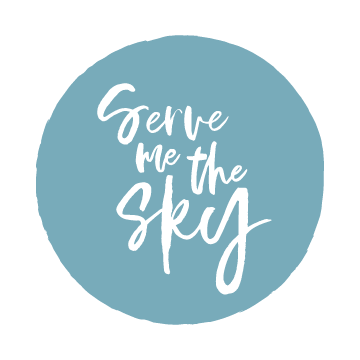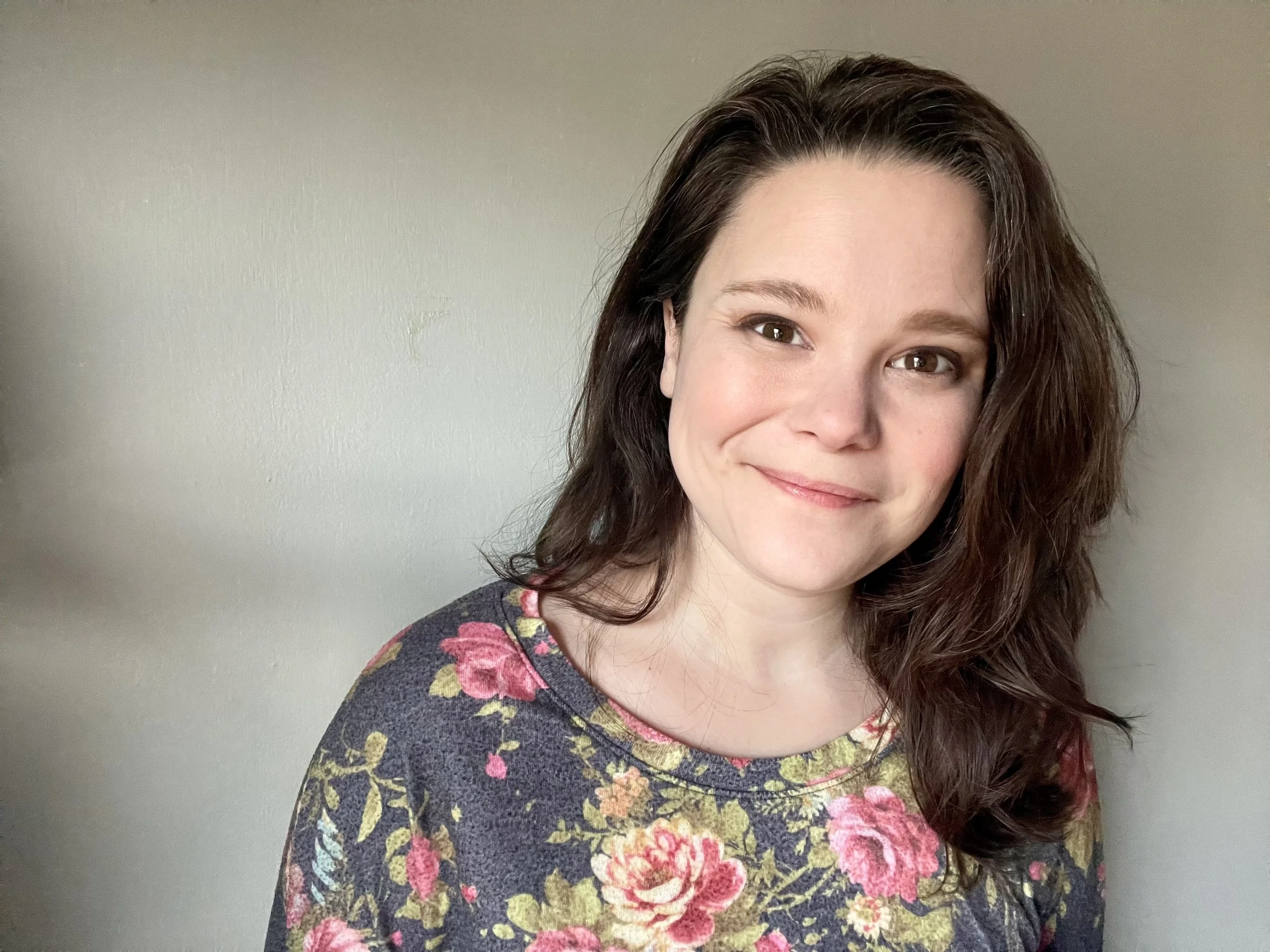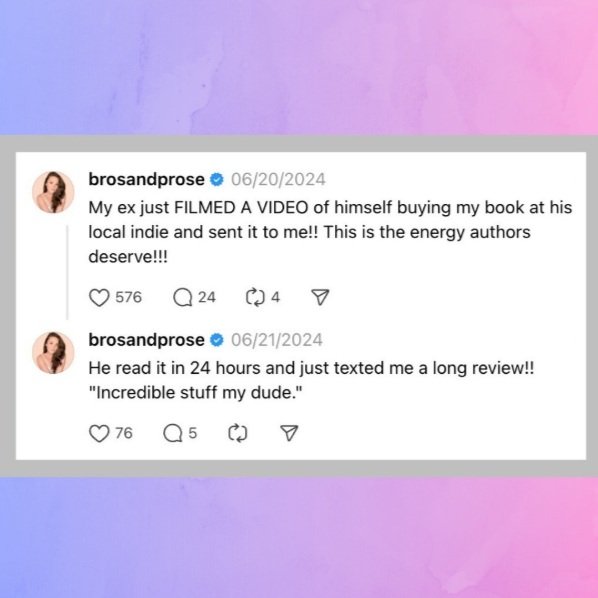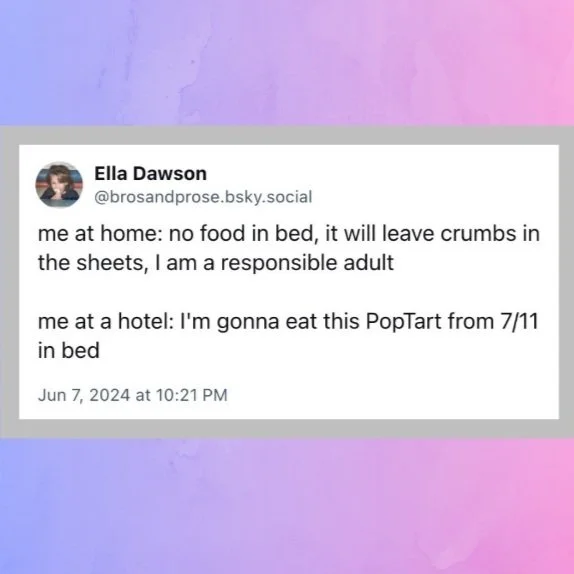A Conversation with Ella Dawson: Burnout, Boundaries, & Being a Person Online
/This post is a continuation of the “A Conversation With” series, where I interview smart humans about their experiences in social media and content creation. You can read past features here.
This month, I interviewed Ella Dawson, an author, digital strategist, and sex & culture critic who has an abundance of experience in social media, both personally and professionally. In this blog post, we explore personal brand, the evolving social media landscape, burnout, boundaries, and how to make money and be a person online.
What are some of your first memories of participating in internet culture?
I remember being in middle school and having a Myspace, then finding things like Livejournal and fanfiction.net shortly after that. My earliest days online were very fandom-oriented, just being an anonymous person nerding out over Harry Potter, the show Heroes, and sharing my own writing online. I was a prolific fanfiction writer and got to connect with strangers in wholesome ways. I miss the days of just chatting in a community, when nothing was monetized.
How did you wind up working in social media? What did you study in college, and what was your first job afterwards?
I was a Feminist, Gender, and Sexuality Studies major in college. My senior thesis was about erotica as a genre and its potential to carry feminist messaging. I really thought I was going to go into feminist erotica. I did some internships with small, independent publishing houses. I worked for Cleis Press; their work is very focused on sexuality, feminism, and queer books. I loved their mission and was very drawn to the marketing responsibilities I had. I loved running their Tumblr account, writing in their brand voice, and celebrating the work they did. Using the internet to reach people was important and I quickly learned that social media was the best way to build communities online.
I’ve always been more drawn to the community and content creation side of social, not as much the paid social side. It’s a mix of artistry and relationship building. The skills I built as an intern translated to working with media companies, nonprofits, and more.
How did you start building a personal brand early on in your career? Was it intentional and strategic, or more organic?
I didn’t set out to do it, it just happened naturally. I had a lot of stuff I wanted to talk about with people! As a millennial, I grew up online and was a digital native. I kind of accidentally accumulated a following online. In 2015, 2016, I was posting a lot about The Bachelor and politics. My unfiltered personality was my brand; I was a bit haphazard with the way that I was posting, honestly.
As I started to write more about sexuality and sexual health, I realized I needed to be more deliberate about what I was sharing and boundaries. I wrote an article for Women’s Health Magazine about my STI status and it went viral. The Daily Mail took a photo of me and my dad on his birthday off my Facebook and cropped him out. I realized that I’m not just hanging out with my friends, I am in public and I am broadcasting.
Tell me more about what you choose to share and what to keep private.
Because of my experiences going viral online, I learned the hard way what it feels like to be overexposed or to have people and publications be invasive. It was a loss of innocence and trust in humankind. When you post online, you have to assume the worst. You have to think about how this post or photo will be perceived by a stranger who doesn’t know your context, your values, your life’s work.
Before I post, I always ask myself, how would my boss react if they saw this? My mom? If it was covered in a newspaper? That’s a discipline I’ve built. I have these internal guardrails when I post now. If I get a little wild, I wonder where I got the confidence to do that. When BlueSky launched, it was like that…and then my dad joined.
I think a lot about context collapse. If you have any familiarity with me, you’ll understand when I’m being sarcastic or when something is bit. I try to always have my PR crisis response Instagram post ready when I do something risky. What’s my one paragraph self defense that will make me seem intelligent? We’re constantly being perceived by strangers. I move through the online world in a defensive crouch. It sucks that we have to do that.
What struggles have you faced working in social media? What are some of the hardest parts of working in social?
Social media is such a difficult industry to work in. There’s the perception that it is easy, dumb, and requires no thought, strategy, or rigor. A few years ago, someone wrote about the pink ghetto of social media–how it’s a feminized career path. There’s a lot of disrespect at the base level.
What really burned me out and made me take a step back a few years ago was being on the frontlines of the internet every day, especially when you’re doing the daily posting and community management. You’re constantly exposed to the firehouse of internet garbage and there’s a lot of dehumanizing, weird stuff. It takes a daily toll on your mental health and your faith in humanity. It’s like being in a toxic workplace 24/7.
There are also no protections for social media employees. I wanted hazard pay when I was working full-time as a social media manager and dealing with a PR crisis. I asked to take medical leave and they told me to use my last 4 vacation days. That was frustrating, demoralizing, and radicalizing. I just wanted to do my job. Those elements of the job are erased, ignored, or go unseen by leadership. Internet culture is getting increasingly hostile. 2016 was a pivot point for me, and online culture has only continued to degrade. You’re constantly in a hostile work environment and none of your coworkers know.
How are you taking care to avoid burnout now after having such an intense experience with it?
I try to embody the ‘I work to live, not live to work.’ Work is something I resent having to do as a human being and I’m allowed to feel that way. I avoid hustle culture, It’s a capitalist invention. I work for money so I can continue to do things that I like. I’ve really changed my relationship with work. Some days I do nothing but play Nintendo Switch. That’s part of being a person who does work. I try not to feel shame when I have days like that. I’ve worked hard to find ways to be my own boss. I try to monetize things that are easy and interesting for me.
Tell me more about how you monetize your online presence–you seem to have a diverse stream of revenue.
My Patreon provides a small but consistent monthly income. I take on consulting projects for clients I really like when the money is agreeable. I create some OnlyFans content when I feel like I need some income. I’ll plan a photoshoot and charge a lot of money for it. I dedicate most of my time to my career as an author, but I consider that in a separate category when it comes to finances because the income is so unreliable.
Lots of us have difficulty asking to get paid when we’re doing something creative that we enjoy. You have to learn how to value the work that you do. If others derive value from it, they will be willing to pay you for it. I’ve worked hard to dismantle that internal shame of asking people for money. Saying “hey, there’s a tip jar!” or “hey, can you give me $3 a month on Patreon?”--that lets me write these weird hot takes about why I don’t like Katy Perry.
In my podcast, I remind people to join my Patreon. I’m paying for software, hosting, and it takes so much time. It’s unlearning the voice that makes it feel icky. People like to support artists directly. Sending your favorite podcaster $4/month feels better than paying Netflix. But when inflation is high, they’ll cut the artists in their budget. It’s incredibly unstable. Having other sources of income helps–I do a lot of petsitting, which is a good revenue stream too.
How have you used your social media marketing skills to market your own romance novel? What’s worked well for you?
It’s been such a joy to promote something I’m passionate about rather than something I’m being paid to promote. My copywriting skills have been helpful. I ask myself, “What’s the most interesting part of this? What are phenomenal quotes from this that I can pull out?” I think about how I approached sharing TED talks and apply that to how I share my book. I’m obviously very emotionally attached to my book, so it’s been helpful to be able to take a more objective step back.
It’s a constant uphill climb against the algorithm. It becomes noisy so quickly. If you crowd it with self promotion and marketing, people get very bored following you. I try to continue to post like normal, and then, “oh also I have a book.” When I was on my book tour, I posted wrap-ups of what I had tweeted, things that humanized the book tour experience and made people curious. It communicated that I’m a normal person who’s funny and you’re coming on a journey with me.
How have your views of social media and personal brand changed over the past 10 years?
TikTok has changed things and made me cranky and cynical about personal brand. Anyone overnight can become an internet superstar. Hailey Welch, the Hawk Tuah girl, is emblematic of this. The majority of people aren’t ready for the level of scrutiny and the amount of rigor and strategic thinking it takes to turn one day of virality into a career. It ruins a lot of lives. People aren’t ready for the complete lack of privacy. Child TikTok stars and YouTube family vloggers are eroding people’s humanity. They get hooked on the serotonin boost of racking up followers.
That’s human nature, but the internet is getting meaner. It’s important to think more about your personal brand and be intentional about it.
Where do you think social media is going in the future?
We’re all going to be increasingly in our little internet corners. I hear a lot from Gen Z and younger folks that they don’t want anything to do with this. Some have a finsta for friends and then a more public-facing one.
The result of Twitter imploding is awareness that these are inherently political spaces that are using you. You’re giving your data and personality away for free. I hope people become more conscious consumers of the internet. Some people are being more deliberate and private, but vast swaths of people are never getting that message and continue to be exploited. Find your community online, wherever it is, and protect it.
You were enjoying Bluesky when we last spoke–are you still enjoying it? Do you think it will take off?
I’m being more strategic about which platforms I use personally. I’m investing my time, clout, and wisdom in places where it’s beneficial to me. I’m part of the creator bonus platform on Threads. I post there knowing I’m doing it to get paid.
I’m still enjoying Bluesky, mostly because I’m deliberate about who I follow. I have a lot of block lists I subscribe to. You have to be intentional about curating your experience online, wherever it is. If it’s not serving you, you don’t need to be there.
What advice would you give to people who are just starting out with building a personal brand and creating content online?
Think deliberately about what your goals are. If your goal is to go viral or become famous, that’s going to lead you down a dark path in terms of the choices you make. There will never be enough followers or views. You will lose your mind.
Is there a type of community you want to build? Do you want to be perceived as an expert? Sell a book? Pitch a script? Is it a source of fun for you? Metrics and numbers are useful, but they’re not the end goal. Set goals that are “have I achieved this, yes or no?” Or decide that it’s a mood thing, and check in on your mood and how it’s making you feel. Be honest with yourself. Choose platforms according to how they make you feel. It’s easier to make tough calls if you’re focusing on how you feel and what you want rather than metrics or a sense of what you “should” be doing.
Who are some of your favorite content creators and/or romance authors to follow on social?
Nellie Wilson–she’s self-published and great at social media, I’ve bought her books from her social. She has a clear voice and set of values. She’s not secretive about writing anti-capitalist books.
Becca Grischow–she became TikTok famous because she talked a lot about her ghostwriting experience. She’s authentic, messy, and funny. Now her first book of her own is out, and it’s been fascinating seeing her share that shift. She was my first podcast guest. She was doing a stunt where she ate a few pages of her book every day. It was so ridiculous and twisted! It was genius. She’s a breath of fresh air and weirdness.
Any final thoughts?
I’ve always known this, but it feels even more true over the past year: the internet and the real world are deeply intertwined. They’re not separate. People online can be incredible friends. Patrons came to my book tour and I got to meet them in person and hear their voices. We live in the internet all the time. Some of my most fulfilling friendships are ones where we’ve only hung out in person. It can be difficult for older people to wrap their heads around it. But it’s a new reality and it’s here.
Where can people find you/your work?
You can find me on Instagram and Bluesky, check out my debut novel But How Are You, Really at your favorite indie bookstore or your local library, and listen to my new romance podcast, Rebel Ever After, wherever you get your podcasts.






